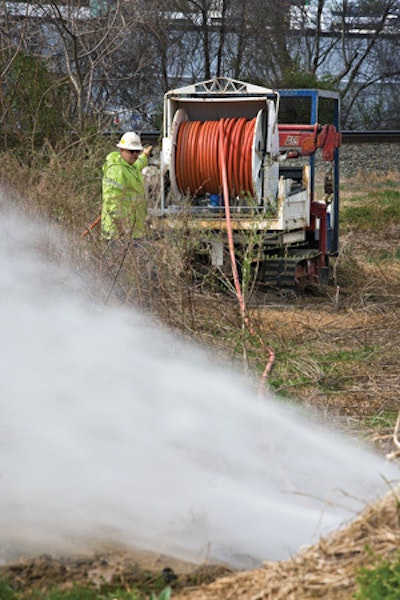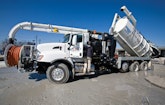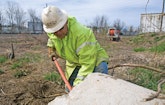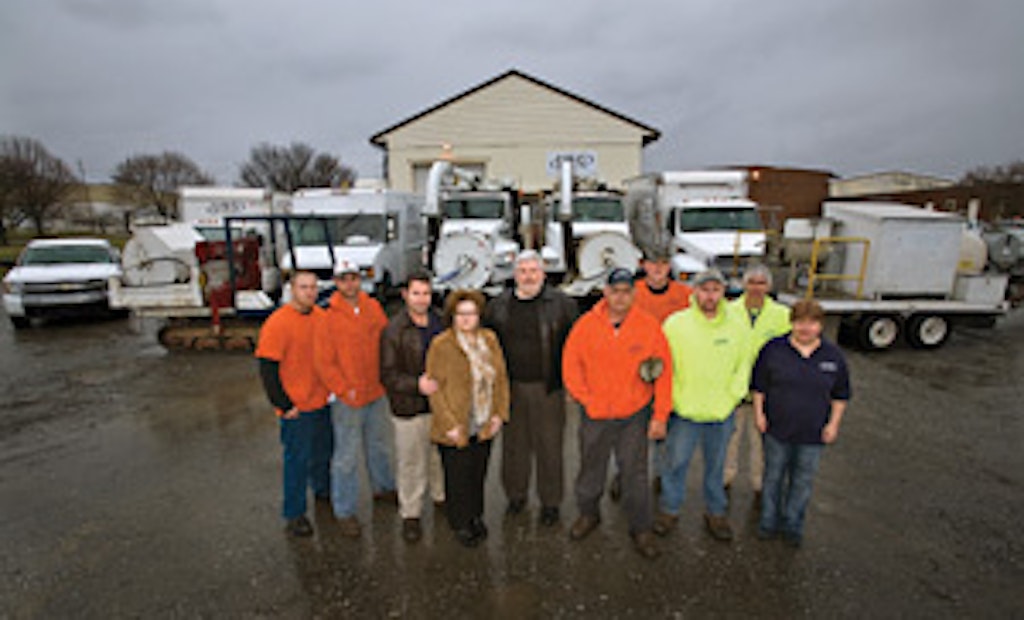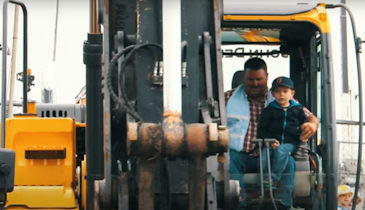Interested in Trucks?
Get Trucks articles, news and videos right in your inbox! Sign up now.
Trucks + Get AlertsSitting in classes at Virginia Tech, Robert Kalbach, III, had a pretty good idea of his future: president of Utility Services Group in Camp Hill, Pa. It wasn’t just a dream. He and his mother, Chiara, started the company in 2005 while he was still pursuing his degree.
He graduated in May 2008 and is now a civil and environmental engineer. “We saw a niche,” Kalbach says. “The things I was learning in class could be directly applied to what we were doing. It was neat having that take on things, being able to talk to professors about the scope of what we were doing.”
Utility Services Group is a turnkey contractor for municipalities, government agencies, site developers, excavators and general contractors. “A lot of other companies have to get multiple subcontractors involved,” Kalbach says. “We can investigate a problem, take it all the way through to a solution, and offer all of it in-house.”
The approach, as he learned at school, is called value engineering. It seeks to optimize function and cost through a team approach to problem solving and project management.
“I see that as one of our big strengths,” he says. “We can offer a complete scope and ensure that everything is getting done correctly with the clients getting exactly what they need.”
The three Cs
The mantra at USG is: communication, cooperation, and coordination, with customers and within the company. “Our focus on detail has helped us rapidly establish ourselves and set us apart from competitors as a specialty contractor in the underground infrastructure industry,” says Kalbach.
“Our people have experience in the different aspects of utility construction,” Kalbach adds. “Several have worked for other jetting, trenchless rehabilitation and I&I investigation companies. We’ve been fortunate to pick up experienced people.”
Training extends well beyond normal manufacturer-provided sessions. “We have internal meetings where we do a lessons-learned analysis and talk about ways to improve our processes,” Kalbach says. “We talk about problems and quality issues our competitors have had and learn from their mistakes. But the key is having veteran employees mentor the younger and less experienced guys.”
Some may see such meetings as unproductive time. Kalbach views them as an investment. “A lot of companies get tied up in the day-to-day grind and lose track of long-term strategy,” he says. “Our company policy is to improve every day and that requires input from the field, office staff and our clients.”
The team drives improvement by looking for root causes: “We’ll sit down and look at what caused a problem. Was there anything in place to keep it from happening? If there was, why didn’t it work? If there wasn’t, what can we put into place?” Later, they’ll analyze the solution to make sure it worked as intended.
It’s a culture that promotes a questioning attitude, reporting of mistakes, and learning rather than punishment for errors which encourages employees to think creatively, develops a team atmosphere, and improves communication with management. “All too often, people fall into the rut of ‘management doesn’t care about me,’ or ‘management doesn’t understand,’” Kalbach says. “That can be very disruptive and very damaging to a business.”
Early growth
Customers noticed the difference early on, according to Kalbach. They like the personal touch and integrity they get from a family-owned business. “I like to touch base with clients and ask how we’re performing. That helps us improve and make sure they’re happy and want us back,” says Kalbach. USG also offers a satisfaction guarantee on all work.
He says the approach has led to good word-of-mouth advertising, allowing the company to maintain consistent growth through its first five years. Jetting is still the backbone of the company and makes up about half the work. Kalbach and his team also do sanitary and storm line flushing/CCTV inspection, vacuum excavation, manhole rehabilitation, grouting, CIPP point repairs, smoke testing, segmented sewer testing, air testing, hydrostatic water-pressure testing, core drilling, concrete saw cutting and turnkey I&I investigations.
The company doesn’t compete with drain cleaners and septic system pumpers. “We focus more along the lines of municipal pump station and collection system maintenance, treatment plant services, and contractor support activities,” Kalbach says.
One specialty project was at a new industrial facility near Harrisburg that couldn’t certify its storm water/spill containment system because an underground line would not hold pressure during testing. The contractor, who couldn’t get paid until the line passed inspection, called in USG.
“We gave a value engineering proposal to find and fix the problem without digging out the pipe, which would have been a nightmare,” says Kalbach. After segment testing every foot, they found a hairline crack running longitudinally through the pipe. The company proposed CIPP lining use the process from Perma-Liner Industries Inc.
The repair passed post-repair TV inspection and pressure testing, so the line could be put into service. Their expertise prevented more work for the contractor and possible penalties. Diagnosing and fixing the problem took less than two days. “We had two happy customers,” says Kalbach.
Taking care of cities
Like many companies, USG does preventive maintenance on municipal storm and sanitary sewers, including inflow and infiltration studies. “We jet the pipe, vacuum out the debris, and then use CCTV to inspect the condition of mainlines and laterals using PACP-certified operators,” says Kalbach.
The resulting report lists defects and also proposes a project-specific rehabilitation plan with a cost-benefit analysis of the various digging and trenchless options. Their service includes assistance in creating budgets and clarifying scope. It is good customer service, he says, but doesn’t always help in getting the job in a highly competitive field.
What does help is having the right equipment, which was rented in the beginning. “As we built a backload and client base, we were able to purchase new, front-line equipment,” he says. “Some companies try to buy older equipment, patch it together and do repairs. Our direction has been to spend the money up front and make it up in productivity, performance and quality.”
Equipment has made a difference in one special aspect of working with municipal pipe maintenance: right-of-way work. Many competitors, he says, avoid work in people’s backyards, along creeks and rivers, in wooded areas, and other challenging conditions. “Municipalities need work performed from manholes where a standard jet/vac truck can’t get close. We come to them with solutions to their problem,” says Kalbach.
USG has acquired new jetters, CCTV equipment, and rubber-tracked vehicles – along with experience – for right-of-way work. “Cleaning on a street, you just pull up to the manhole and jet the line,” Kalbach says. “There are a lot more logistics in right-of-way work. In some cases, it’s physically impossible to get vehicles to a manhole. You have to be careful about getting stuck, rutting up people’s yards, and causing big hassles. We’ll spend the time to plan it out before going on site.”
Harford County, Md., for instance, has contracted with USG to televise and clean a large quantity of sewer lines. “They range in size from 4-inch service laterals to 48-inch interceptor lines, some within easements where access has been a definite challenge,” says Kurt Westendorf, P.E., of the Harford County Division of Water and Sewer. “Their work effort has been diligent, thorough and efficient, from the initial review of the work to the final submittal of deliverables.”
Looking to expand
Growth is still on the agenda for Utility Services Group. Kalbach and his mother read industry magazines and attend conferences looking for the next service or technology to offer.
One possibility is geographic information systems (GIS). While it is different than waterjetting and maintaining infrastructure, the engineering background of the firm’s management staff makes them aware of the potential value. “GIS, although costly, can give municipalities and their engineers an excellent tool to manage their infrastructure,” Kalbach says.
Expansion will require building on the trust of customers and employees. “One thing that’s very important in business is having people around that you trust,” he says. “My mom and I have a very good relationship. She’s been around the construction industry her whole life and passes that knowledge to me constantly. We both believe in delegating responsibility to everyone in the company. We look for people who are motivated, want to be challenged, and want to think.”
